- Home
- Muriel Spark
Complete Poems: Muriel Spark Page 3
Complete Poems: Muriel Spark Read online
Page 3
As nine o’clock shivered the dark balcony
I heard horses beating by;
And saw, below, white-coated riders, white-sided
Beasts blanketed against the cold and skyless
And groundless general benightment.
It was a white presentment
With one red light before, one red behind it.
‘They pass every night.’ Because
Of this I came to stay, small as it was.
Smaller still by daylight; much crockery
Had to go; many books were abandoned; so too,
A hoard of smooth planks, they had to go.
It is not altogether a mockery.
Horses alone I could not greatly care for,
But this by night is a company so corporate,
I call it a Horse, of regimental state.
Let no prodigal neighbour spend me therefore:
I am aware of this obvious school of riding,
And do not count it remarkable that late
And locally flies the Horse. What’s to be wondered at
Is myself, that nightly to be dundered at
From a street without moment the whole length of it,
I mark the nine o’clock Horse, residing
Here, hemmed-in, on the strength of it.
Intermittence
The old ridiculous partner is back again
who speaks my mind before me, singing me now
fonder than ever, my embarrassing vancourier.
I am her fool, the noisy one to follow
years at a time, and know her for my other
who sounds my superstition like a bagpipe.
I am her acrobat and altogether
lacking an answer loud enough I
somersault to her tune, how sick soever.
I left her once
for seven years long:
then she piped
and I did not dance.
Little it recks that
seven long years
I wept not
although she mourned,
since she is back again and the mood is on.
So must I bear my old she-wolf, who once
suckled the rising moon,
to blow her pipes, and I will dance again.
Letters
I’m sorry I can’t come to-day;
I have dozens of letters
to write.
Oh, letters. You and your
dozens of letters.
Yes, I’ve let them pile up
by the gross
And to-day’s the day of
reckoning.
Oh, leave your letters, just let
them lie.
•
I’m sorry I can’t come to-day;
I have received a letter.
A letter!
Yes, a letter. I have to
attend to it to-day.
Of course, of course, let’s
make it another day.
Holidays
The month of the holidays,
where is the . . . who can find
him . . . the electrician, there
is a water problem, the oil tank
leaks, do you know what
that means? It is the holidays, there are
no electricians, no shops, no tanks,
no cisterns. Nails
are breaking, blood does not gush.
Ring, ring, ring, dial 023
dial 576 and 999. Nothing
doing, my friend. All the machines
are dead. Money doesn’t speak.
Nobody. The desert.
And now come the floods.
Escape, escape quickly. Leave
everything. No point in locking
up.
Go away, far far away. The
month of the holidays.
Facts
Father was a debt-collector
Mother casalinga (Italian for housewife)
Siamese cat
favourite son
and an outcast son.
Go off on a holiday.
Leave the outcast at home.
What holiday? Drugs? Marocco? Where?
Never seen again.
Cleaned up the camper like new & sold it.
He had a place in London
Took 9 mil. lire (about three thousand pounds)
out of the bank.
DNA blood; tiny bit.
Yes, shot them all—pointed out graves,
can’t find bodies.
What happened to the cat?
Complaint in a Wash-out Season
My mind’s in pickle. Think of my talents all soused
in rainwater, April you All Fools’ Month, you’ve doused
the light of your joke. Call off this protracted
intransigent deluge, it’s hackneyed;
nothing to grizzle about now—winter’s gone knock-kneed,
so turn off the tap,
you monstrous infant wetting Infinity’s lap.
You turned the garden hose on;
you spat a million missiles aslant through a hundred dozen
long-range peashooters. You should be past
practical jokes in bad taste;
and what an old has-been you look when you flash
in the face of the sun in a shot-silk taffeta sash
and lift the petticoat clouds and dance a fandango.
You’ve rinsed the guaranteed colours out of the rainbow.
At least, when you wash your dye-streaked hair,
be so kind as to shake it out elsewhere,
and request the adenoidal firmament
not to sneeze all over my temperament.
Litany of Time Past
What’s today?
Hoops today.
What’s yesterday?
Tops yesterday.
What’s tomorrow?
Diabolo.
Moons and planets come out to play,
The Bear bowled, the Sun spun.
See the Devil-on-sticks run
Today, tomorrow, and yesterday.
What’s Hope?
Skipping rope.
What’s Charity?
Salty peppery.
What’s Faith?
Edinburgh, Leith,
Portobello, Musselburgh,
and Dalkeith.
Out you are.
In you are.
Mustard.
Vinegar.
The Fall
The European Bison fell from grace.
So did the white-tailed Gnu.
Likewise the Blesbok, as also the Mountain Zebra.
The Giant Tortoise must have sinned too.
Everyone knows about the Dodo;
The same goes for the Great Auk.
The inoffensive Okapi’s crime
Was trying to be other beasts at the same time.
And there is the case of the Blue-Buck.
They all came to a halt and are dissolved in mystery.
Who remembers, now, Steller’s cullionly Sea-Cow?
It, too, through its innocent fault
Failed the finals in history.
Faith and Works
My friend is always doing Good
But doubts the Meaning of his labour,
While I by Faith am much imbued
And can’t be bothered with my Neighbour.
These mortal heresies in us
Friendship makes orthodox and thus
We are the truest Saints alive
As near as two and two make five.
Conundrum
As I was going to Handover Fists
I met a man with seven wrists.
The seven wrists had seven hands;
The seven hands bore seven bonds;
The seven bonds hid seven wounds:
How many were going to Handover Fists?
And as I was going to Kingdom Come
I met a dog of twenty ton.
The twenty ton had twe
nty parts;
The twenty parts bore twenty hearts;
The twenty hearts gave twenty barks:
How many were going to Kingdom Come?
The Messengers
Arriving late sometimes and never
Quite expected, still they come,
Bringing a folded meaning home
Between the lines, inside the letter.
As a scarecrow in the harvest
Turns an innocent field to grief
These tattered hints are dumb and deaf,
But bring the matter to a crisis.
They are the messengers who run
Onstage to us who try to doubt them,
Fetching our fate to hand; without them
What would Sophocles have done?
Fruitless Fable
Mr Chiddicott, being a bachelor,
Purchased from a reputable department store
(Barkers’) a morning-tea machine
At the price of fifteen pounds fifteen.
Easy to work, all plugged and wired.
Each night, he set the time required,
And every morning when he heard
The bell, he found his tea prepared.
But being by profession something mechanic
Mr Chiddicott began to perfect it,
So that before long when it woke him up
It actually handed him the cup.
Years pass. Mr Chiddicott grows
Successful as a cabbage rose,
Mellow, unmated and serene,
Served by the morning-tea machine.
Alas, the transience of bliss—
There came a sudden end to his.
One morning as it rang the bell,
The tea-machine said, ‘What the hell,
I’ve stood this treatment long and dumb;
Mr Chiddicott, the time has come
For you to make the tea instead.
Nip out and let me into bed.’
And when our friend demurred, alack,
The tea-machine gave him a dreadful crack.
Mr Chiddicott murmured as he curled
Up, ‘It is the end of the world.’
But it wasn’t, for Mr Chiddicott came
To, and finally admitted blame,
And every morning now he can be seen
(From the windows across the street, I mean)
Serving tea to his perfected tea-machine.
Note by the Wayside
To you, fretful exemplar, who claim to place
Love before all success and kindness above
Any career, I answer yes, well said, my dear,
If you have the particular choice:
If you’re gifted, I mean, in love
And also special in life’s performances.
But are you so very clever and so very nice?
Mungo Bays the Moon
My dog Mungo under my window
Barks in the dark. Is that an owl?
What fowl? What foe? His note ends
in a howl
So now I know. He bays the
Full-bellied moon, my Mungo dog.
Here in Tuscany they say
Never move the wine when the moon
is full,
Never prune the trees while she waxes.
Your hair your nails your beard are
growing long
With the swelling moon, the moon, and
Mungo’s song
Declares the same. Magnetic moon
He howls, my Mungo dog. Pregnant
ball in the sky,
Most pregnant, listen-to-me, my serenade,
my howl.
He comes out of his kennel to sing
in the night,
My Mungo, my brown dog.
Panickings
Scream scream I am
being victimized wickedized
You are he said to me
a destroyer
an enemy
and I will dish he said
the dirt scream scream
You can’t do this to me I wish
you dead my job my life
hand over your purse
he said immediately or I
scream scream and worse I
am a scholar I spook I rake
I lose my voice
every dollar counts I’ll do worse
scream scream I am.
The Hospital
I want to fall asleep in the chair
by the bed.
Someone calls from the corridor:
Tom! I must keep her records up
deck o’cards
neck of duck
(That’s up to them) I myself
want to fall asleep on fine sheets,
don’t you think?
Who will keep my eyes shut?
The Empty Space
A square space on the wall
marks the memory of that picture
painted at night, stolen at night,
worked on at night, in Rome, from the
artist’s window.
How I remember Castel St. Angelo
in her night picture, gleaming with
history-in-darkness, guardian of old Rome,
and the artist’s home was full of midnight
and the light of all Europe shone in her hands.
She painted till dawn, having thought
to herself one night, I will paint
that scene, and started
and patiently full-heartedly pursued it
and did it completely—large, dark and light.
My honest close companion on the wall:
It is all over now. The thieves came by night.
Hats
I was writing a poem called
Hats.
I had seen a shop window
in Venice, full of
Hats.
There were hats for morning,
for evening, men’s hats, girls’
Hats.
There were hats for fishing
And hats dating back to
Death in Venice
His hat so Panama, hers such a
Madame de Staël
Hat.
I was writing a poem about
Hats
Hats for a garden party, hats
For a wet day, hats for a
wedding party, a
memorial service.
There were hats for golf and
Hats for tennis. Bowler hats,
Top hats for the races, floral
headgears equally.
And as I wrote this poem
Sitting in a square with my coffee,
I was called over to see a friend.
Only for an instant. I shoved
The poem in my handbag and
I slung the bag over the chair.
Only an instant.
And gone, gone forever, handbag
poem, my hats, my hats.
Also my passport.
What was in the bag? said
the policeman.
Some money, a passport
and a poem.
How did it go, that poem?
I wish I could remember.
Anger in the Works
Anger filled her body and mind, it
permeated her insides, her throat
and heart throbbed with anger. (‘Beware
the ire of the calm.’) There was
anger in her teeth, nails and hair.
It drummed in her ears.
‘How lovely to see you,’ she said,
‘Do sit down.’
Dimmed-Up
The advantage of getting dim-sighted
Is that there are only outlines and no dinkety details.
Everyone’s skin is smooth.
Everyone’s eyebrows are arches.
Everyone’s eyes are black points.
Everyone’s clothes are clean.
Telegraph poles look like poplars
And a dark room looks like
it’s supposed to be.
The pictures on the walls of the hotel
Look like art
And I can never find my glasses.
While Flicking Over the Pages
Noticed by chance an entry in
Who’s Who
(b. 1912) the man so truly promising:
good school, Oxford, career in
Foreign Office,
Egypt, Greece, exotic places (but then
Paraguay—something of a comedown).
First novel well celebrated—remember,
they called him an artist to his
fingertips.
Now why, bewildered, does he
trot around,
an office-boy of literature, snatching
the opportunity to write a paragraph
of wasp-like criticism, here and there,
and tittle-tattle over the garden-fence?
Oh what went wrong and how
under the aspect of eternity
did his trivial genes develop, his fine ones
wither?
Standing in the Field
That scarecrow standing in the field
is dress-designed as if to move
all passers-by to tears
of sorrow for his turnip face,
his battered hat, his open arms
flapping in someone else’s shirt,
his rigid, orthopedic sticks
astride in someone else’s jeans,
one leg of which is short, one long.
He stands alone, he stands alone.
To the Gods of My Right Hand
Whoever the gods may be that come to occupy
the lodging of this limb, of them I make supplication
for the health of my right hand, waxing now
to her proper appointment; let them never forsake
her wrist’s contrivances that strike at last
the waters of the Word where Babylon
enjoys no more her songs. Whoever the gods,
let them enter my right hand, never
to forget her cunning in the first and the last encounter.
That Lonely Shoe Lying on the Road
One sad shoe that someone has probably flung
out of a car or truck. Why only one?
This happens on an average one year
in four. But always throughout my
life, my travels, I see it like

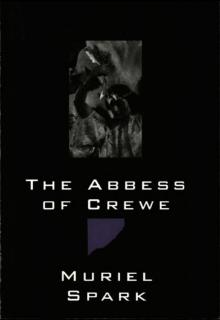 The Abbess of Crewe: A Modern Morality Tale
The Abbess of Crewe: A Modern Morality Tale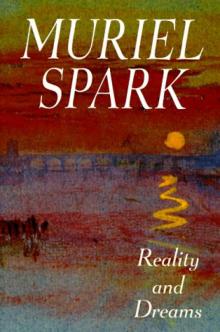 Reality and Dreams
Reality and Dreams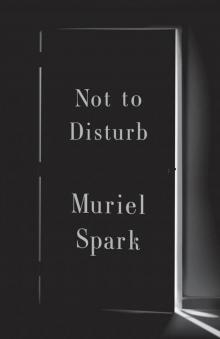 Not to Disturb
Not to Disturb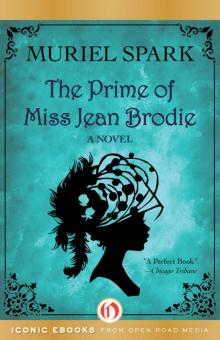 The Prime of Miss Jean Brodie
The Prime of Miss Jean Brodie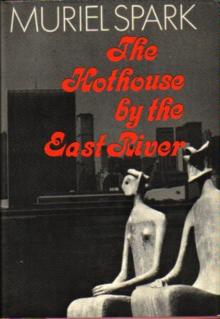 The Hothouse by the East River
The Hothouse by the East River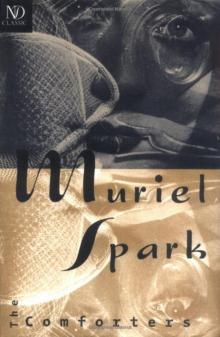 The Comforters
The Comforters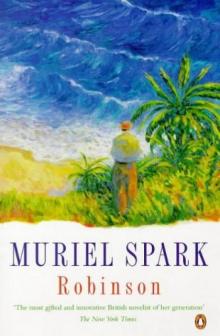 (1958) Robinson
(1958) Robinson Unknown
Unknown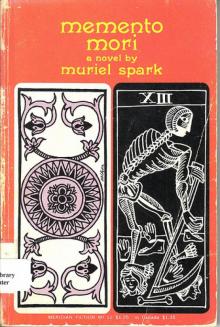 Memento Mori
Memento Mori The Finishing School
The Finishing School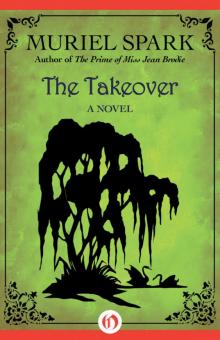 The Takeover
The Takeover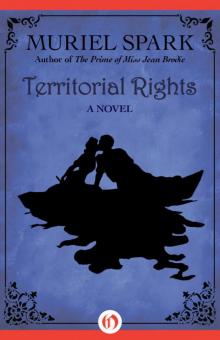 Territorial Rights
Territorial Rights The Complete Short Stories
The Complete Short Stories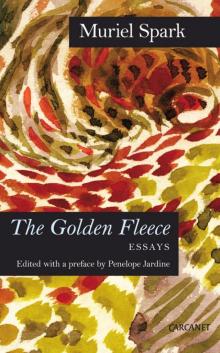 The Golden Fleece: Essays
The Golden Fleece: Essays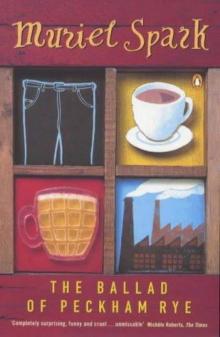 The Ballad of Peckham Rye
The Ballad of Peckham Rye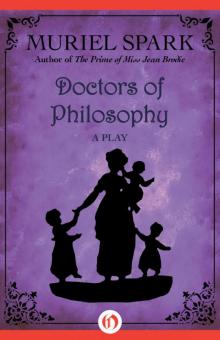 Doctors of Philosophy: A Play
Doctors of Philosophy: A Play The Mandelbaum Gate
The Mandelbaum Gate Loitering With Intent
Loitering With Intent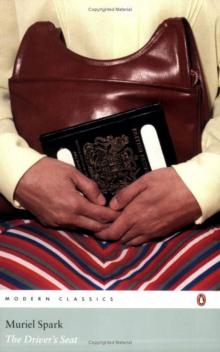 The Driver's Seat
The Driver's Seat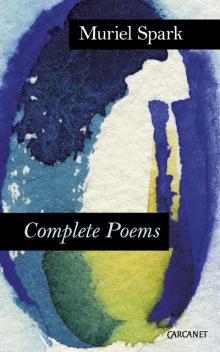 Complete Poems: Muriel Spark
Complete Poems: Muriel Spark Symposium
Symposium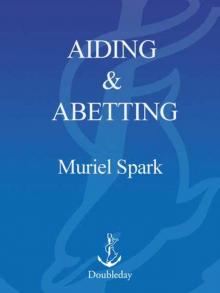 Aiding and Abetting
Aiding and Abetting The Golden Fleece
The Golden Fleece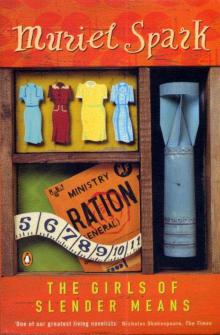 The Girls of Slender Means
The Girls of Slender Means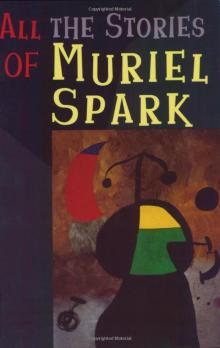 Alice Long’s Dachshunds
Alice Long’s Dachshunds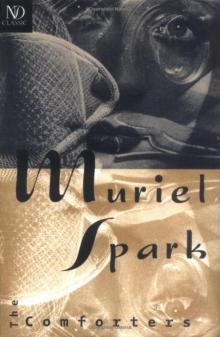 (1954) The Comforters
(1954) The Comforters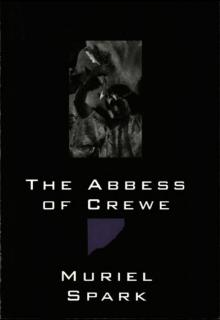 The Abbess of Crewe
The Abbess of Crewe Curriculum Vitae
Curriculum Vitae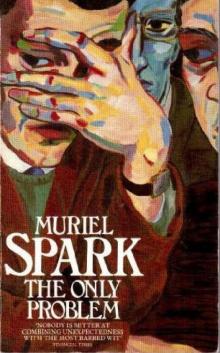 The Only Problem
The Only Problem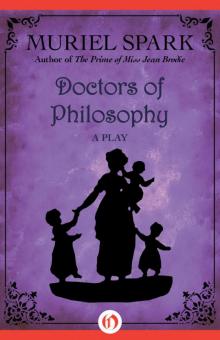 Doctors of Philosophy
Doctors of Philosophy